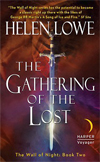.
Can you believe it's June already? Time swoopin' by, as it does! Howeverz, it does mean we're at #5 in the "Great Leaders In Speculative Fiction" series -- *and* the spotlight is on the inimitable Katniss Everdeen from Suzanne Collins' "The Hunger Games" trilogy.
 |
| Katniss Everdeen |
Up until now, the leaders featured in this series have all come from a leadership background in their society -- yes, even Kaladin in Stormlight Archive, although his background is by no means as elevated as that of Dalinar Kholin.
Katniss, though, truly is a commoner, and poor with it. Not only that, she's a poor commoner from one of her society's poorest Districts (think state, province, shire.) Although close to her mother and sister, she's also a loner except for her hunting buddy, Dale, who is also a friend.
 |
The most interesting aspect of Katniss as a leader, not just a hero and champion (although she's very clearly that, too) is that she remains a loner throughout. From the moment she volunteers to take her sister's place in the Hunger Games lottery, Katniss's leadership is moral, rather than the more usual paths of governance or military prominence.
 |
In her person, and by her deeds, she exemplifies a riposte, and an alternative, to the cruelty and repression of the Capitol, which masterminds the Hunger Games.
I feel very sure everyone reading this knows the Hunger Games premise, but 'just in case', every District must supply two of their children, one girl, one boy, to the Capitol every year, to compete in an arena where all tributes must kill or be killed. Only the last tribute standing survives the arena.
 |
And no one volunteers -- except for Katniss. The second book is titled Catching Fire and Katniss burns very brightly throughout, but it is a flame of moral integrity as well as physical and mental courage. The combination of the two make her an inspirational leader as well. Seeing and hearing her, people's spirits catch alight. They want to follow her example and do as she does.
 |
Yet Katniss always stands alone. In part, because she sees the realities and uncomfortable truths that most people prefer to avoid. The trilogy ends, as it begins, with Katniss taking a moral stand -- but this time, it's not one that all, if any, among those who follow her, readily understand.
Katniss has been pushed to a brink. The fact she survives it illustrates the degree to which she has become more symbol than person. The symbol cannot be allowed to fail, or fall, which is also why her final deed carries so much weight and does bring a lasting end to the Hunger Games.
 |
Yet for all the fires Katniss has lit, she is more alone at the end than at the outset. And however bright her personal flame, the path from the Games, through revolution, to reach that end was always a precipice, with death on one side and failure of integrity on the other.
Unquestionably, though, the fire Katniss Everdeen lit was a conflagration, both in the trilogy's world of Panem, and in readers' enthusiasm for her story.

About Helen Lowe

Helen Lowe is an award-winning novelist, poet, and lover of story. With four books published to date, she is currently completing the final instalment in The Wall Of Night series.
.
Helen posts regularly on her “…on Anything, Really” blog, monthly on the Supernatural Underground, and tweets @helenl0we.
Previous Posts: Great Leaders in Speculative Fiction -- Where To Find 'Em & Why they Rock
February: Mara of the Acoma in the Empire series by Raymond E Feist & Janny Wurts
March: Kaladin and Dalinar in The Stormlight Archive by Brandon Sanderson
April: Pyanfar Chanur in "The Pride of Chanur" series by CH Cherryh
















No comments:
Post a Comment